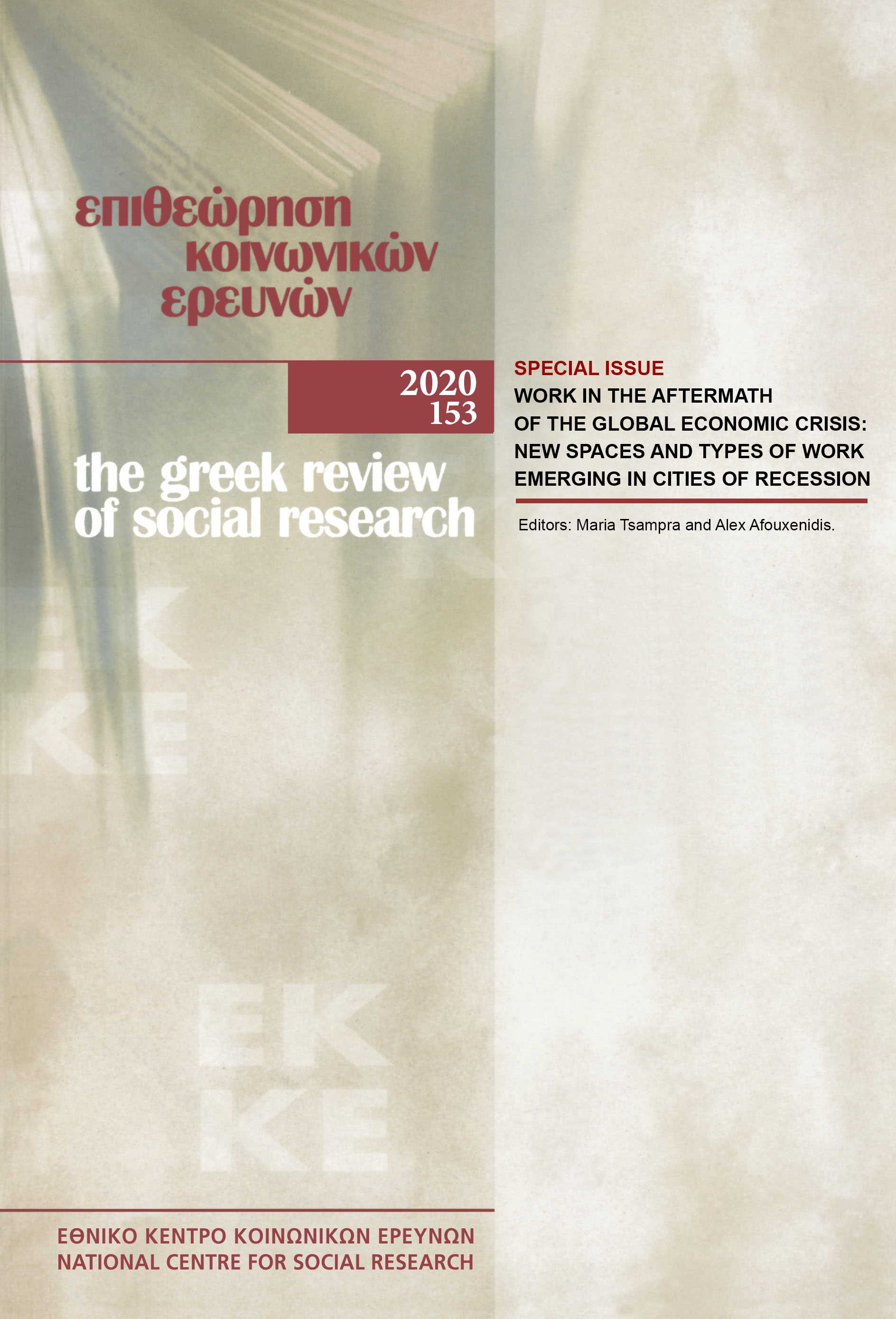The emergence of desperate optimists: Μanaging the start-up working life in times of crisis

Περίληψη
Η ανάδυση της γενιάς των «απελπιστικά αισιόδοξων»: Διαχείριση της εργασιακής ζωής στις νεοφυείς επιχειρήσεις στα χρόνια της κρίσης
Το βάθεμα της ελληνικής κρίσης συνέβαλε στην αυξανόμενη προβολή συνεργατικών εργασιακών μονάδων όπως θερμοκοιτίδων και κόμβων επιχειρηματικότητας όπου φιλοξενούνται νεοφυείς επιχειρήσεις στο αθηναϊκό κέντρο. Λόγω περιορισμένων εργασιακών επιλογών νέοι υψηλών προσόντων δραστηριοποιούνται επιχειρηματικά. Το παρόν άρθρο εξερευνά τους τρόπους με τους οποίους οι νέοι αυτοί επιχειρηματίες διαχειρίζονται την επιχειρηματική τους εργασιακή ζωή, αναλύοντας τις διακριτές ποιότητες του εργασιακού τους βίου καθώς και τον τρόπο με τον οποίο δομούν τον επιχειρηματικό τους εαυτό. Η παρούσα ποιοτική έρευνα σκιαγραφεί έναν απαιτητικό εργασιακό βίο που στερείται ισορροπίας μεταξύ εργασίας και προσωπικής ζωής. Παρόλο, όμως, τον επισφαλή της χαρακτήρα, η επιχειρηματική καριέρα βιώνεται ως μια εξαιρετικά δημιουργική επιλογή που ανταμείβει τους νέους επιχειρηματίες τόσο σε επαγγελματικό όσο και σε προσωπικό επίπεδο. Ταυτόχρονα, το γεγονός ότι η επιχειρηματική τους δραστηριότητα υπαγορεύεται σε μεγάλο βαθμό από αναγκαιότητα αποσιωπάται, ενώ οι νέοι εργαζόμενοι παρουσιάζουν τους εαυτούς τους ως παθιασμένους και επίδοξους επιχειρηματίες. Το γεγονός ότι δραστηριοποιούνται εργασιακά και επιχειρηματικά από ένα συνεργατικό εργασιακό περιβάλλον συντηρεί και ενισχύει την ελπίδα, και βαθιά πεποίθησή τους ότι θα καταφέρουν να αμείβονται για αυτό που πραγματικά αγαπούν. Ως εκ τούτου, στην παρούσα συγκυρία, παρατηρούμε την ανάδυση μια νέας γενιάς εργαζόμενων, αυτής των «απελπιστικά αισιόδοξων». Μιας γενιάς που δέχεται με στωικότητα τις επισφαλείς συνθήκες εργασίας του, καλλιεργεί μια βαθιά και παθιασμένη σχέση με την εργασία και για αυτό δέχεται να αναλάβει το επιχειρηματικό ρίσκο με κάθε κόστος.
Λεπτομέρειες άρθρου
- Πώς να δημιουργήσετε Αναφορές
-
Papageorgiou, A. (2020). The emergence of desperate optimists: Μanaging the start-up working life in times of crisis. Επιθεώρηση Κοινωνικών Ερευνών, 153, 141–166. https://doi.org/10.12681/grsr.22344
- Ενότητα
- Άρθρα

Αυτή η εργασία είναι αδειοδοτημένη υπό το CC Αναφορά Δημιουργού – Μη Εμπορική Χρήση 4.0.
Οι συγγραφείς των άρθρων που δημοσιεύονται στην Επιθεώρηση Κοινωνικών Ερευνών διατηρούν τα δικαιώματα πνευματικής ιδιοκτησίας επί των άρθρων τους, δίνοντας στο περιοδικό το δικαίωμα της πρώτης δημοσίευσης. Άρθρα που δημοσιεύονται στην Επιθεώρηση Κοινωνικών Ερευνών διατίθενται με άδεια Creative Commons 4.0 και σύμφωνα με την άδεια μπορούν να χρησιμοποιούνται ελεύθερα, με αναφορά στο/στη συγγραφέα και στην πρώτη δημοσίευση για μη κερδοσκοπικούς σκοπούς.
Το Εθνικό Κέντρο Κοινωνικών Ερευνών διατηρεί το δικαίωμα να δημοσιεύει, να αναπαραγάγει, να παρουσιάζει στο κοινό, να διανέμει και χρησιμοποιεί άρθρα που δημοσιεύονται στην Επιθεώρηση Κοινωνικών Ερευνών σε οποιοδήποτε μέσο και μορφή είτε μεμονωμένα είτε ως μέρη συλλογικών έργων, για όλο τον χρόνο διάρκειας προστασίας της πνευματικής ιδιοκτησίας και για όλες τις χώρες του κόσμου. Αυτό περιλαμβάνει ενδεικτικά και όχι αποκλειστικά το δικαίωμα δημοσίευσης των άρθρων σε τεύχη της Επιθεώρησης Κοινωνικών Ερευνών, αναπαραγωγής και διανομής μεμονωμένων αντιγράφων των άρθρων, αναπαραγωγής ολόκληρων των άρθρων σε άλλη έκδοση του Εθνικού Κέντρου Κοινωνικών Ερευνών, καθώς και αναπαραγωγής και διανομής των άρθρων ή περίληψης αυτών με χρήση πληροφορικού συστήματος αποθετηρίου.


